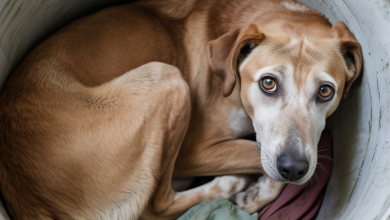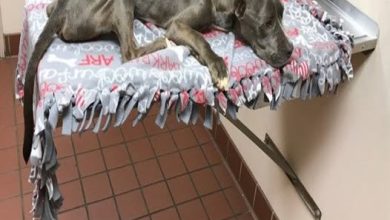The Whisper of a Child, The Will of a Dog: The Unforgettable Rescue of Boss
The world is full of noise. It’s a constant barrage of headlines, notifications, and fleeting opinions that roar past us every single day. In this deafening storm, it’s easy for the small, quiet sounds to get lost—the whispers of distress, the faint cries for help. But sometimes, if we listen closely enough, one of those whispers can cut through the chaos and set in motion a chain of events so profound it reminds us of the power of a single voice and the unyielding strength of the will to live. This is one of those stories. It begins in a quiet, unassuming town in Ukraine, on a street like any other, where a young girl named Xenia was about to make a choice that would ripple through the lives of strangers and save a soul she had never even met.
Xenia was an observant child. She noticed the way the sunlight filtered through the leaves in the late afternoon, the patterns the rain made on her windowpane, and the changing seasons that painted her neighborhood in different hues. She also noticed her neighbors. She knew who left for work early, whose cat liked to sunbathe on the fence, and when new families moved in or old ones moved on. So, when the family next door packed their bags and drove away, it wasn’t unusual. What was unusual was what they left behind.
At first, it was just a feeling, a subtle wrongness. The house was dark and silent, but there was a presence there. Then she saw them: two dogs, tethered in the backyard. One was a sturdy-looking animal, the other a handsome Labrador with kind eyes. She assumed the owners were on a short trip and had arranged for someone to care for them. Days turned into a week, then two. The water bowls remained empty. The food dishes, overturned. The dogs, once active and alert, grew listless. Their barks of greeting turned into mournful whimpers that punctuated the lonely nights.
Xenia’s concern grew into a gnawing anxiety. She would watch from her window, her heart aching for the two lonely figures. She was just a child; what could she do? She told her parents, who were worried but hesitant to interfere with a neighbor’s property. The days stretched into a month, and the situation grew dire. A faint, sickeningly sweet odor began to drift from the property on the breeze—the smell of decay, of life giving up. The whimpers from the yard had ceased. There was only silence now, a heavy, dreadful silence that felt louder than any cry.
The smell was the final straw. Xenia knew she couldn't wait any longer. She had seen people ask for help on social media before. It seemed like a place where voices could be heard, where communities could come together. With trembling fingers, she typed out a message on a local community Facebook page. She didn’t have many details, just what she had witnessed. She wrote about the owner who had been gone for a month, the two dogs left tied up, and the terrible smell that now permeated the air. She attached the photos she had taken from her window, blurry images that nonetheless captured the stark reality of the neglect. She hit “post” and held her breath, praying for help to arrive.
The response was not what she expected. Instead of a flood of support and offers to help, she was met with a wave of cynicism and cruelty. Strangers accused her of exaggerating, of seeking attention. “It’s probably not that bad,” one comment read. “Why are you getting into other people’s business?” another sneered. “Pics or it didn’t happen,” a third demanded, dismissing the very photos she had provided. The comments piled up, each one a small sting, a dismissal of the horror she was witnessing. To a young girl, the anonymous scorn of the internet was overwhelming. She felt foolish, embarrassed, and utterly helpless. The people who were supposed to help were laughing at her. With tears blurring her vision, she deleted the post. The whisper had been silenced.
But she was wrong. In the digital world, nothing ever truly disappears. Before Xenia deleted her cry for help, a screenshot had been taken. A single person had seen her post, believed her, and sent the image to the one place that might be able to do something: the local animal shelter.
The shelter was a place fueled by impossible odds and boundless compassion. The staff and volunteers ran on shoestring budgets and sheer determination, facing a relentless tide of abandoned, abused, and neglected animals every single day. Burnout was a constant threat, and heartbreak was part of the job description. On this particular day, the team was already stretched thin. The kennels were full, the medical bills were piling up, and a sense of exhaustion hung in the air.
It was then that the message arrived. A volunteer showed the shelter’s lead rescuer, a woman named Olena, the screenshot of Xenia’s now-deleted post. Olena stared at her phone, her brow furrowed. She had seen countless cases of neglect, but something about this one struck a deep chord. It was the child’s simple, direct words, the raw fear and desperation behind them. And it was the images. Though blurry, they showed a scene of abject misery—a dog slumped against the ground, its posture one of complete surrender.
“She deleted it,” the volunteer said. “People were being awful to her.”
Olena’s heart sank. She imagined the young girl, brave enough to speak up, only to be shouted down by the faceless mob of the internet. The cruelty of it was infuriating. But beneath the anger, a cold sense of urgency was taking hold. The girl had mentioned a smell. To a seasoned rescuer, that was a code-red alarm. It meant time had already run out for someone.
“Do we have an address?” Olena asked, already knowing the answer.
“No. No name, no street. Just the photos and what she wrote.”
It was a ghost story, a digital whisper of a tragedy unfolding somewhere in their city. For many larger, bureaucratic organizations, that would have been the end of it. No address, no case file, no action. But this was not one of those places. This was a team that operated on instinct and heart. Olena called a quick meeting, projecting the screenshot onto a wall for her small team to see.
“We have nothing to go on,” her colleague, a pragmatic man named Viktor, stated, rubbing his tired eyes. “This city is huge. It’s a needle in a haystack.”
“I know,” Olena said, her voice quiet but firm. “But a child saw this. A child smelled this. She was brave enough to ask for help. We can’t be the ones who ignore her just because it’s difficult. Look at the photos. We have to try.”
There was a moment of silence as the team looked at the images again, truly absorbing the bleakness they portrayed. They all knew what that kind of stillness meant. They knew the smell. Olena’s conviction was contagious. A silent, collective decision was made. They would find that house. They would honor that child’s courage. They would go searching for the needle in the haystack.
The search was a grueling exercise in frustration and fading hope. They split up, driving through neighborhoods that vaguely matched the style of the house in the photos. For three hours, they canvassed the city. They showed the blurry photo to mail carriers, to shopkeepers, to people out walking their dogs. Most shrugged, unable to help. Some looked at them with suspicion. With each passing hour, the vastness of the city seemed to mock them. The sun began to dip lower in the sky, casting long shadows that mirrored the growing dread in their hearts.
They were chasing a memory, a digital echo. The fear that they were already too late was a heavy weight in the rescue van. Olena drove, her eyes scanning every house, every yard, her mind replaying Xenia’s words. “I can smell something rotten.” She pushed her foot down on the accelerator.
Just as they were about to give up for the day, to regroup and try again tomorrow—a tomorrow the dogs might not have—they got a break. A woman watering her garden squinted at the photo on Olena’s phone. “I think I know this place,” she said slowly. “The fence looks familiar. I think it’s a few streets over. A family moved away recently.”
Her directions were vague, but it was the first real lead they’d had. A surge of adrenaline cut through their exhaustion. They followed the woman’s directions, their hearts pounding. They turned down a street, and then another. And then Viktor, in the passenger seat, pointed. “There. That’s it.”
It was the house from the photos. The fence was the same. The shape of the roofline matched. But the reality was far worse than any picture could convey. The property was steeped in an aura of profound neglect. The grass was overgrown and yellowed. Trash was strewn about the yard. And the smell… it was overwhelming. It clung to the air, thick and putrid, a tangible announcement of death.
The team approached the gate, their rescue equipment feeling uselessly small against the magnitude of the tragedy before them. The house was silent. The yard was silent. There were no barks, no movement. Olena’s hand trembled slightly as she unlatched the gate. They stepped onto the property, and the world seemed to slow down.
They found the first dog almost immediately. It was lying in the dirt, its tether pulled taut. There was no question. The animal was gone, its body a heartbreaking testament to its owner’s betrayal and the world’s indifference. A wave of collective grief and white-hot anger washed over the team. They stood in silence for a moment, bearing witness to the life that had been so cruelly extinguished. There were no words for a moment like this, only a shared, hollow ache.
But there was a second dog. Xenia had said there were two. Pushing past their sorrow, they began to search the overgrown yard. Behind a dilapidated shed, they found him. It was the Labrador. He was lying on his side, his body shockingly thin. His beautiful coat was matted with filth, and he was terrifyingly still. For a horrible second, they thought they had lost him too.
Olena knelt beside him, moving slowly so as not to startle him. “Hello, boy,” she whispered, her voice thick with emotion. At the sound of her voice, his tail gave a single, almost imperceptible thump against the dirt. A flicker of life. An ember of hope in the ashes of despair. His eyes opened, cloudy and weak, but they focused on her. In them, she didn't see anger or fear. She saw a profound weariness, a soul that had been waiting for an end that had not yet come.
He was alive.
With the utmost care, they worked to free him. His collar was embedded in his neck, and his body was too weak to stand. Viktor gently scooped the skeletal frame of the Labrador into his arms. The dog let out a soft sigh, a sound of utter surrender, and rested his head against Viktor’s chest. He was a whisper of a dog, more spirit than substance.
As they carried him to the rescue van, away from the house of horrors that had been his prison, Olena looked at his noble face. He had endured the unimaginable. He had survived. He needed a name that reflected not what he was, but what he would become. A name that was a promise.
“We’ll call him Boss,” she said, the word cutting through the somber atmosphere. “Because from this moment on, he’s in charge of his own life. He’s the boss.”
The ride to the veterinary clinic was a blur of frantic energy and whispered reassurances to the precious cargo in their arms. Boss lay on a soft blanket, barely moving, his breathing shallow. Every red light, every bit of traffic felt like a personal affront, a theft of the precious seconds he might not have. When they burst through the doors of the clinic, the veterinary team sprang into action.
The initial assessment was grim. Boss was severely emaciated and dangerously dehydrated. His organs were under immense stress from prolonged starvation. He was anemic, his body simply not having the resources to produce enough red blood cells. The vet, a kind but direct woman named Dr. Anya, didn't sugarcoat the situation. “He’s in critical condition,” she told Olena. “His body is shutting down. We’ll do everything we can, but you need to prepare yourselves.”
But Olena and her team refused to give up. They had not come this far to lose him now. They had made him a promise. Dr. Anya suggested their only real chance was an immediate blood transfusion to give his body the strength it needed to start fighting back. It was a risky and expensive procedure, but there was no hesitation.
Boss was stabilized with IV fluids while the clinic scrambled to find a suitable blood donor. Word went out, and a fellow rescuer rushed over with her own healthy, robust dog, a gentle giant who became an unwitting hero. As the life-saving blood flowed into Boss’s frail body, the rescue team waited, their hopes pinned on this one last, desperate measure. They watched him, their hands resting gently on his thin frame, trying to will their own strength into him.
And then, slowly, miraculously, a change began. A touch of color returned to his pale gums. His breathing, once shallow and ragged, began to deepen and even out. Hours later, after the transfusion was complete, he lifted his head. He looked around the sterile room, his eyes a little clearer, a little more present. A vet tech offered him a bowl of water, and he drank, long and deep. It was the first victory in a war for his life.
Later that evening, they offered him a small amount of special recovery food. He ate. He didn't just pick at it; he ate with a quiet determination, as if he knew this was his fuel for the fight ahead. The rescue team watched, tears welling in their eyes. This dog, who had been left to die, who had every reason to have given up, was choosing life. He was fighting, and he was showing a resilience that humbled them all.
Boss’s recovery was not a straight line; it was a slow, arduous climb. He spent many days at the veterinary clinic, receiving round-the-clock care. Each day, he grew a little stronger. The light in his eyes grew a little brighter. His personality, long buried under layers of suffering, began to emerge. He was gentle, patient, and impossibly sweet. He would greet his caregivers with that same small, hopeful thump of his tail, a gesture that spoke volumes of his gratitude. He held no grudges. His spirit was pure.
Once he was stable enough to leave the clinic, he couldn't go to the main shelter. He was still too fragile, his immune system too compromised. He needed the peace and quiet of a real home to continue his emotional and physical healing. A call was put out for an experienced foster parent, and a woman with a reputation for mending broken spirits stepped forward.
The first day in his foster home was a revelation for Boss. He stepped tentatively onto a soft rug, his paws sinking into the plush fibers, a sensation he had likely never known. He was shown a warm, clean bed that was just for him. He circled it a few times, unsure, before collapsing onto it with a sigh so deep it seemed to carry all the pain of his past. That night, for the first time in a very long time, he slept soundly, safe from the elements, his belly full, his heart secure.
His foster mom was patient and kind. She taught him that human hands could offer gentle pets instead of pain, that voices could be soft and reassuring. She helped him regain his strength with short, slow walks, celebrating every small milestone. He discovered the joy of a squeaky toy, the simple pleasure of a sunbeam on the floor, and the comfort of a steady routine. He was learning how to be a dog again. He was learning to trust.
As Boss blossomed in his foster home, the shelter shared his story online. This time, there was no ridicule. There was an outpouring of love, support, and outrage at what he had endured. His story—and the story of Xenia, the little girl who started it all—went viral. Donations poured in to cover his extensive medical bills. People from all over the country followed his updates, cheering for his progress. He became a symbol of hope, a testament to the resilience of the spirit.
Among the thousands of people who read Boss’s story was a family in Kiev. They had recently lost their own beloved senior dog and the silence in their home had become unbearable. They weren't actively looking for a new dog, believing it was too soon. But then they saw Boss’s face. They read about his ordeal and were moved to tears by his gentle nature and his incredible will to live. They didn’t just see a dog who needed a home; they saw a dog who could teach them about forgiveness and strength.
They filled out an application, their hearts full of hope. The shelter, which had received dozens of applications for Boss, carefully vetted each one. But there was something special about the family from Kiev. Their application spoke of patience, understanding, and a deep love for animals. After several long conversations and a virtual home check, a decision was made. Boss had found his forever family.
The day his new family drove the long hours from Kiev to meet him was filled with a nervous, joyful energy. When they walked through the door of the foster home, Boss, now a healthier, happier version of himself, looked up. He walked over to them, not with the trepidation of a timid dog, but with a quiet confidence. He sniffed their hands and then leaned his head against the father’s leg, looking up at him with those same kind, soulful eyes that had captivated Olena in that desolate backyard. It was a perfect match. He had chosen them, just as they had chosen him.
The farewell was emotional for his foster mom and the shelter staff. They had poured their hearts into his recovery, and he had left a permanent mark on them all. But seeing him climb eagerly into the car with his new family, ready for the next chapter, was the ultimate reward. «We appreciate his new family so much,» the shelter wrote in a final update. «We will always miss you, Boss.»
Boss’s new life was everything he had ever deserved. He had a big, soft bed, but he usually preferred to sleep on the floor of his new parents' bedroom. He had a yard to play in, where he would chase balls with a goofy, joyful abandon. He had two human siblings who adored him, showering him with affection and sneaking him treats. He went on long walks in the park and car rides to the countryside.
He was no longer the broken, skeletal creature from the abandoned yard. He was a happy, healthy, and profoundly loved member of a family. The scars of his past remained, both visible and invisible, but they no longer defined him. They were simply a part of his story, a story that was now about love, not suffering.
Sometimes, in a quiet moment, when he is curled up at his family's feet, they will look at him and marvel at the journey he has taken. They think about the cruelty that left him for dead, but more than that, they think about the chain of goodness that saved him. They think about the observant little girl who refused to be silent, the tenacious rescue team that refused to give up, the skilled veterinarian who brought him back from the brink, the patient foster mom who taught him to trust again, and the community of strangers who cheered him on.
Boss’s story is a powerful reminder that in a world full of noise, it is often the quietest voices that we need to listen to the most. It is a testament to the fact that cruelty and indifference can be conquered by compassion and action. And it is the story of a dog with an unbreakable spirit, a dog who was given the name Boss as a promise—a promise that was finally, beautifully, and completely fulfilled.




